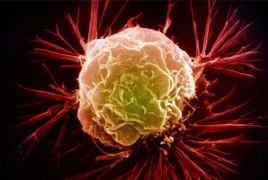Addicted to ran, ovarian cancer cells stop moving when deprived July 10, 2019 - 18:01 AMT PanARMENIAN.Net - Did you know that 90% of cancer patients die from distant metastasis? The latter occurs when cancer cells have the ability to move within the patient's body and invade its healthy tissues. In a study published in Nature Communications, researchers from the University of Montreal Hospital Research Centre (CRCHUM) have shown the key role that a protein called Ran plays in the mobility of ovarian cancer cells. They demonstrated these cells cannot migrate from cancerous sites without the help of Ran, Medical Xpress says. Implicated in cancer development and survival, Ran is often referred to as a shuttle protein mostly supporting transport between the inside of a cell and its nucleus. In ovarian cancer cells, the team of researchers, led by Dr. Anne-Marie Mes-Masson and Dr. Diane Provencher, showed Ran acts as a taxi to the cell membrane for another protein, RhoA, which is important in cell migration. "In normal cells, RhoA can make its way directly to the cell membrane but in ovarian cancer cells it cannot. It has to link to Ran first in order to reach the cell membrane. It really needs a ride," said Mes-Masson, a researcher at the CRCHUM, professor at Université de Montréal and member of the Institute du cancer de Montréal. "In our study, we showed that in cancer cells where we inhibit the action of Ran, RhoA gets broken down. Without RhoA, cancer cells lose then their ability to move, migrate and invade healthy tissues." Thanks to the vast expertise in biochemistry of the first author, Dr. Kossay Zaoui, the science team was able to explain at least in part why Ran is so important in a cancer cell. In many cancers high expression of Ran is often associated with poor outcomes. "We have previously demonstrated that Ran is a good therapeutic target. Our study helps us understand when and in which cancer patients our approach might be most beneficial. As healthy cells do not need Ran to move around, we can target the cancer cells without touching the healthy cells. Based on our findings, it is probable that inhibiting Ran will also be a winning strategy in other cancers," said Dr. Provencher, a researcher at CRCHUM, Head of the Division of Gynecology Oncology, professor at Université de Montréal and member of the Institute du cancer de Montréal. The researchers have already begun to develop small molecules that can inhibit Ran and are testing them in the preclinical models they have developed to show that they can slow or eliminate cancer development. They hope one day that these new drugs will make their way into the clinic to be used to treat ovarian cancer patients. Azerbaijani authorities report that they have already resettled 3,000 people in the Nagorno-Karabakh town of Stepanakert. On June 10, Azerbaijani President of Azerbaijan Ilham Aliyev will leave for Turkey on a working visit. Azerbaijani President Ilham Aliyev arrived in Moscow on April 22 to hold talks with Russian counterpart Vladimir Putin. Authorities said a total of 192 Azerbaijani troops were killed and 511 were wounded during Azerbaijan’s offensive. Partner news |